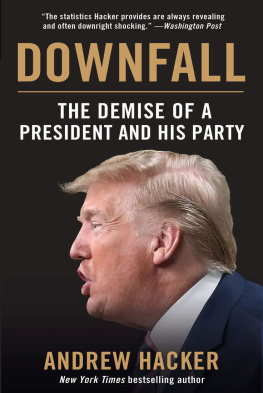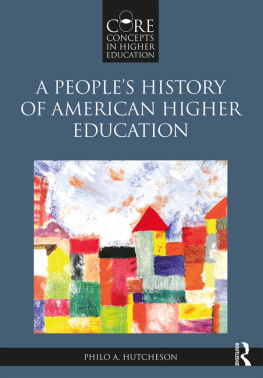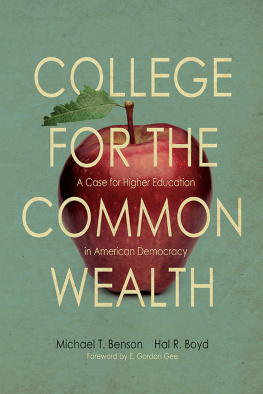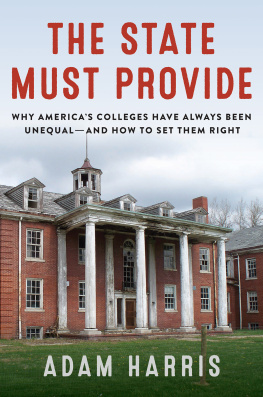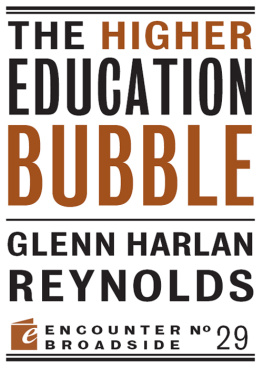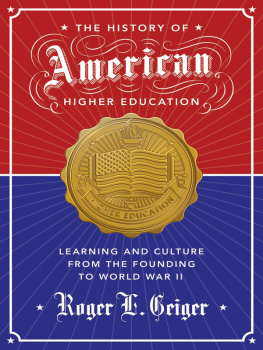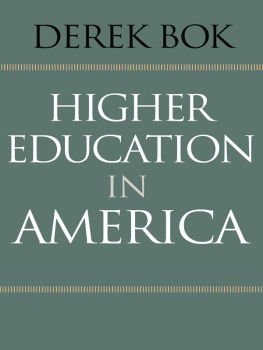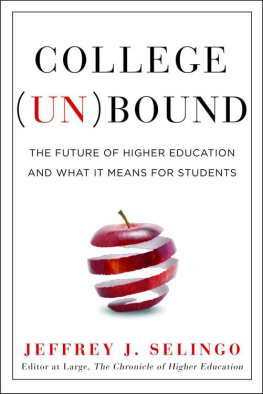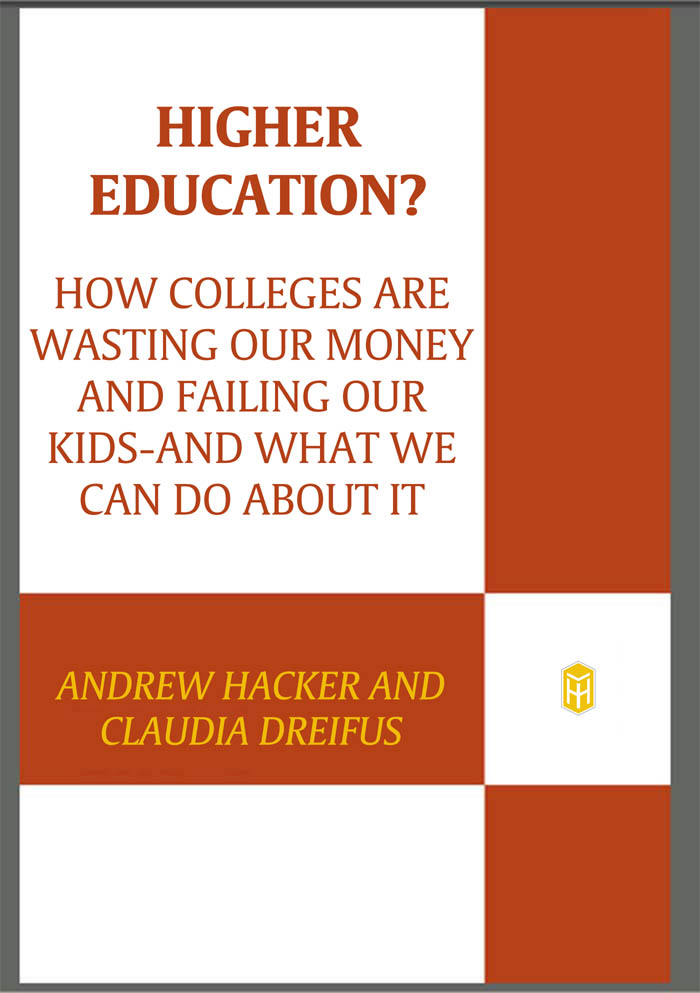ALSO BY ANDREW HACKER
Mismatch: The Growing Gulf Between Women and Men
Money: Who Has How Much and Why
Two Nations: Black & White, Separate, Hostile, Unequal
The End of the American Era
Political Theory: Philosophy, Ideology, Science
ALSO BY CLAUDIA DREIFUS
Scientific Conversations:
Interviews on Science from The New York Times
Interview
Seizing Our Bodies: The Politics of Womens Health (editor)
HIGHER EDUCATION?
HIGHER
EDUCATION?
HOW COLLEGES ARE WASTING OUR MONEY AND
FAILING OUR KIDSAND WHAT WE CAN DO ABOUT IT
ANDREW HACKER AND CLAUDIA DREIFUS
TIMES BOOKS HENRY HOLT AND COMPANY NEW YORK

Times Books
Henry Holt and Company, LLC
Publishers since 1866
175 Fifth Avenue
New York, New York 10010
Henry Holt is a registered trademark of
Henry Holt and Company, LLC.
Copyright 2010 by Andrew Hacker and Claudia Dreifus
All rights reserved.
Distributed in Canada by H. B. Fenn and Company Ltd.
Some material in the book has appeared, in slightly different form,
in the New York Review of Books.
Library of Congress Cataloging-in-Publication Data
Hacker, Andrew.
Higher education? : how colleges are wasting our money and failing our kidsand what we can do about it / Andrew Hacker and Claudia Dreifus.1st ed.
p. cm.
Includes index.
ISBN 978-0-8050-8734-5
1. Education, HigherUnited States. 2. College costsUnited States. 3. College teachersUnited States. I. Dreifus, Claudia. II. Title.
LA227.4.H33 2010+
Henry Holt books are available for special promotions and
premiums. For details contact: Director, Special Markets.
First Edition 2010
Designed by Kelly S. Too
Printed in the United States of America
1 3 5 7 9 11 8 6 4 2
To our countrys students, who deserve better
CONTENTS
HIGHER EDUCATION?
INTRODUCTION:
HIGHER EDUCATION?
Every year, in the closing days of summer, a large swath of middle-class Americans engage in a ritual unique to their culture. In driveways from Brookline to Bakersfield, they fill their vehicles with newly purchased goods, ranging from laptops to designer jeans, high-end sneakers, and coffeemakers. In the back sits Jennifer or Jeremy, sending off last-minute text messages to friends. Mom and Dad MapQuest for the best route to towns with names like Chapel Hill, Northfield, and Pomona.
Welcome to the Annual Migration, when some 2.6 million freshmen take their first steps toward adulthood at the nations 4,352 colleges and universities. For most families, its an emotional moment. If their destination is one of what Barrons Guide calls the most competitive institutionssay, Stanford or Emory or Kenyonthe parents feel theyve secured a first-class education for their children, plus a reserved place at the table of the nations elite. If this family is departing for a state-supported institutionperhaps Florida Atlantic or Michigan Statethe journey may be another milestone in their quest for upward mobility, a chance for the next generation to move up a rung or two, or even to the top. In either case, this trip will cost far more than the fuel and tolls.
In fact, for those who have to pay the whole tab, a bachelors degree from a prestigious private college will set a family back more than a quarter of a million dollars. At this writing, a years tuition, room, and board at the aforementioned Kenyon College comes to $49,290. (True, some families negotiate discounts on the tuition. But at schools like Kenyon a majority of students are or are close to being full payers.) And this doesnt count books, clothes, off-campus snacks, or a summer course at the University of Perugia, which could add another $10,000.
By comparison, the sticker prices at public colleges seem a bargain. Tuitions for in-state residents range from $4,187 at Florida Atlantic to $11,434 at Michigan State. But room and board and other costs are essentially what they are at private schools. Not to mention a car, sorority dues, and football tickets. Thus four years at Boca Raton or East Lansing can easily top $100,000. Moreover, charges at both public and private colleges have more than doubledin real dollarscompared with a generation ago. Does this signal that the education being provided is twice as good?
This is serious money, by any standard. For most Americans, educating their offspring will be the second-largest outlay theyll ever make. Only the home mortgage will cost more, and you may live forty years in the house. And if parents cant or wont pay, youngsters can find themselves burdened with a staggering load of loans. Graduating with six figures worth of debts isnt a high-end horror storyits becoming increasingly common.
So are colleges and universities giving good value for these investments? And what are families buying? Is it training for high-status professions? Or exposure to new ideas, stimulating teachers, and a chance to flex their intellects? Then theres John Deweys notion of education as preparation for democratic citizenship. And for those attending a sleepaway school, a safe space where the kids can move toward adulthood. Higher education is a $420 billion industry. What are individualsand our society as a wholegaining from it?
The question mark?in our title is the key to this book, and it will be doing double-duty. As we consider our countrys colleges and universities, two questions will recur on every page. The first is how much of what the schools are offering can reasonably be called education? For example, we will show that over half of all undergraduates now enroll in vocational training programs, which range from standbys like nursing and engineering to new arrivals like resort management and fashion merchandising. While were sure something is imparted in these classes, were not comfortable calling it education. For us, that designation has to mean more than any instruction coming after the twelfth grade. So enter our second question: even if not vocational, how far can what is being taught and learned reasonably be called higher? In our view, college should be a cultural journey, an intellectual expedition, a voyage confronting new ideas and information, together expanding and deepening our understanding of ourselves and the world. Even on academic tracks, were not persuaded this is happening. For this reason, well be taking a close look at fields commonly called the liberal arts. Higher education should set a high bar for itself. It can be done. Weve seen it being done.
Moreover, higher education should be open to every young person, and this is an option we can well afford. We confess to being born-again Jeffersonians: we believe everyone has a mind, the capacity to use it, and is entitled to encouragement. Of course, students have to do their share. But the adults who have chosen higher education as their profession have even greater obligations, which were not convinced theyre fulfilling.
Even after acknowledging the difference between education and training, colleges have embraced enterprises that are neither of the two. Universities have become multiversities, staffed by casts of thousands and dedicated to everything from esoteric research to semi-professional athletics. The result has been a significant bloating of the universitys original mission and intentions.


